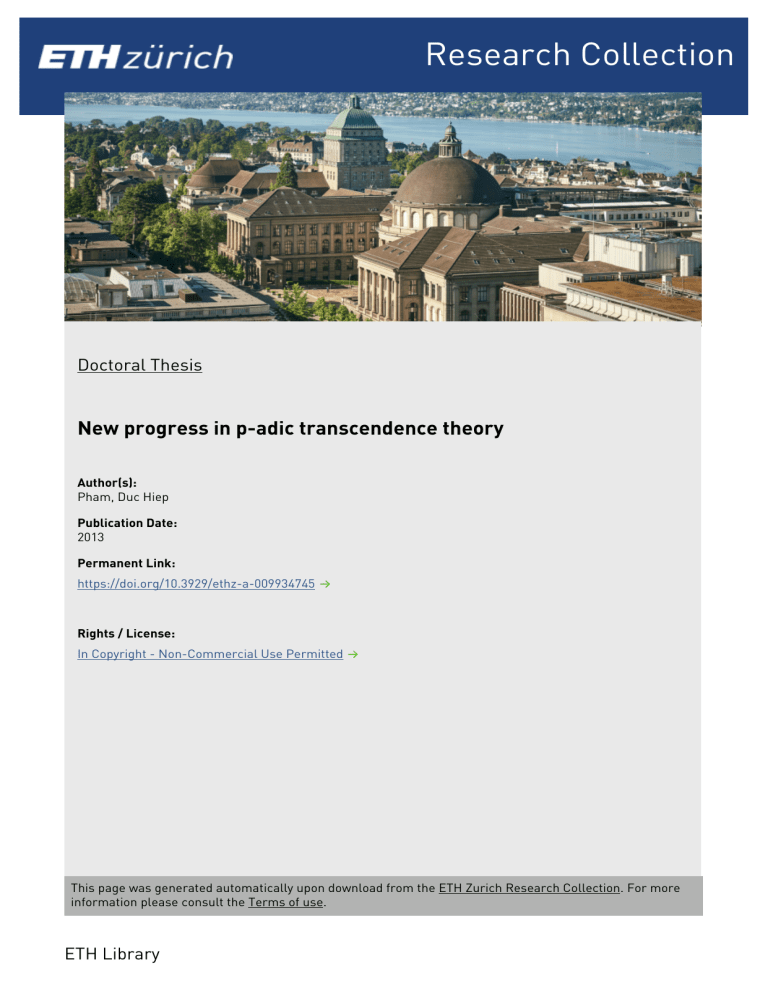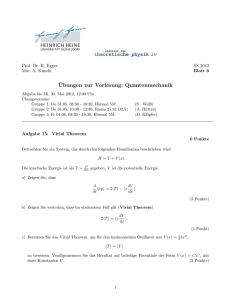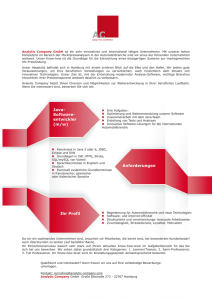New progress in p-adic transcendence theory
Werbung

Research Collection Doctoral Thesis New progress in p-adic transcendence theory Author(s): Pham, Duc Hiep Publication Date: 2013 Permanent Link: https://doi.org/10.3929/ethz-a-009934745 Rights / License: In Copyright - Non-Commercial Use Permitted This page was generated automatically upon download from the ETH Zurich Research Collection. For more information please consult the Terms of use. ETH Library DISS. ETH NO. 21233 New progress in p-adic transcendence theory A dissertation submitted to ETH ZURICH for the degree of Doctor of Sciences presented by Duc Hiep Pham Msc (M1) Math. HNUE born September, 24, 1984 citizen of Vietnam accepted on the recommendation of Prof. Dr. Gisbert Wüstholz, examiner Prof. Dr. Clemens Fuchs, co-examiner 2013 Abstract The main purpose of this thesis is to present a new result on Diophantine approximation over p-adic fields concerning commutative algebraic groups and new results on p-adic transcendence theory. Using the same method we formulate and prove a p-adic version of the Wüstholz analytic subgroup theorem, a statement which was recently already given by Matev. As an application we deduce the transcendence of a new class of p-adic numbers by using the p-adic analytic subgroup theorem. We shall combine classical methods from Diophantine approximation and from transcendence theory with tools in p-adic analysis in order to achieve this. Let G be a commutative algebraic group defined over a number field K that is disjoint over K to Ga and satisfies the condition of semistability. Consider a linear form l on the Lie algebra of G with algebraic coefficients and an algebraic point u in a p-adic neighbourhood of the origin with the condition that l does not vanish at u. We give a lower bound for the p-adic absolute value of u which depends up to an effectively computable constant only on the the height of the linear form, the height of the point u and p. It is well-known that the Wüstholz analytic subgroup theorem is one of the most powerful theorems in transcendence theory. The theorem gives in a very systematic and conceptual way the transcendence of a large class of complex numbers, e.g. the transcendence of π which is originally due to Lindemann. Analogously, it is possible to get results on p-adic transcendental numbers by using the p-adic analytic subgroup theorem. In the last chapter of the thesis we give new proofs for some of the results proved before and deduce new results not obtained so far by just using the classical methods in the p-adic domain. ii Zusammenfassung Das Hauptergebnis dieser Arbeit ist ein neues Resultat aus der Diophantischen Approximation über einem p-adischen Körper, welches für kommutative algebraische Gruppe formuliert ist. Darüberhinaus werden neue Ergebnisse aus der p-adischen Transzendenztheorie präsentiert. Die Beweismethode des Hauptresultates wird verwendet um eine p-adische Versions des analytischen Untergruppensatzes von Wüstholz anzugeben und zu beweisen; dieses Resultat wurde kürzlich bereits durch Matev erzielt. Als Anwendung dieses Resultates werden dann eine Reihe von neuen Transzendenzergebnissen für p-adische Zahlen gezeigt. Für den Beweis werden klassische Methoden aus der Diophantischen Approximation und Transzendenztheorie mit Hilfsmitteln aus der p-adischen Analysis kombiniert. Sei G eine kommutative algebraische Gruppe, die über einem Zahlkörper K definiert sei, welche disjunkt zur additiven Gruppe Ga ist und die Bedingung der Semistabilität erfüllt. Betrachte weiter eine Linearform l auf der Liealgebra von G mit algebraischen Koeffizienten, sowie einen algebraischen Punkt u in der p-adischen Umgebung des Ursprungs, sodass l bei u nicht verschwindet. In der vorliegenden Arbeit wird eine untere Schranke für den p-adischen Absolutbetrag von l(u) gegeben, welche nur von einer effektiven Konstante, der Höhe der Linearform, der Höhe des Punktes, sowie von p abhängt. Es ist wohl bekannt, dass der analytische Untergruppensatz von Wüstholz eines der wichtigsten Ergebnisse der modernen Transzendenztheorie ist. Dieser Satz gibt eine überaus systematische und konzeptionell schöne Möglichkeit, um für eine grosse Klasse von komplexen Zahlen die Transzendenz nachzuweisen. Als eine Anwendung erhält man den Lindemannschen Satz über die Transzendenz von π. In analoger Weise ist es möglich aus der p-adischen Version des analytischen Untergruppensatzes die Transzendenz einer grossen Klassen von p-adischen Zahlen zu zeigen. Im letzten Kapitel der vorliegenden Arbeit geben wir neue Beweise von einigen bekannten solchen Resultaten, und ergänzen sie durch einige neue Ergebnisse, die mit den bisherigen klassischen Mitteln aus dem p-adischen Werkzeugkasten noch nicht gefunden worden sind. iii

